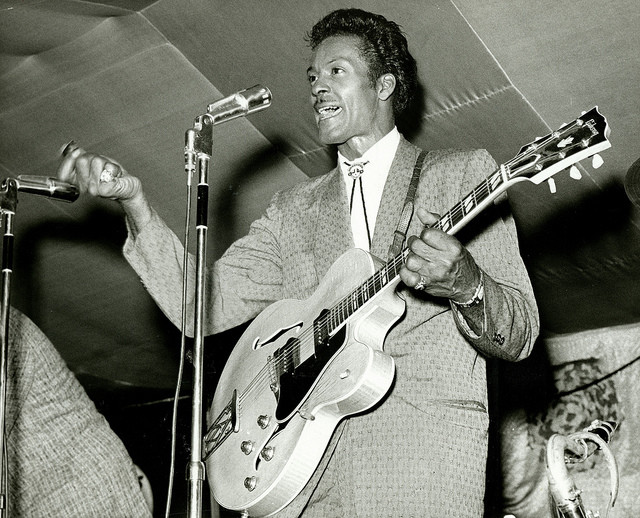This is the latest from The Bluesmobile’s C.C. Rider, who spends her life venerating the founding fathers of the blues. She’s walked the crooked highways of this singing country to resurrect the voices of the past. With the dirt of the Delta on her hands, she sleeps in the shadow of the giants on whose shoulders popular music now stands.
Chuck Berry
(b. October 18, 1926 – d. March 18, 2017)
Chuck Berry took country, combined it with blues, and made a whole new genre. You might have heard of it. Rock n’ Roll. Sure, there’s lots of fathers of rock n’ roll, lots of claims to its invention. But Chuck’s got a pretty compelling argument. As John Lennon once said, “if you tried to give rock and roll another name, you might call it ‘Chuck Berry’.”
Berry was a rough character who lived a tough life. Born in St. Louis, he gave his first performance at a High School talent showcase. Shortly after, still in high school, he was convicted of armed robbery and sent to a reformatory. In the joint he formed a singing group, and got so good he was let out periodically to perform on the outside. When he got out at age 21, he worked as a factory worker and trained as a beautician. But all the while he was practicing his music, developing the style that would make him famous. The style that would alter the face of music forever.
See, Chuck completely changed the game. In 1955, he takes a road trip to Chicago, and catches a Muddy Waters show. Berry approaches Waters and asks where to go if he wants to cut a record. Muddy says—Chess, go to Chess Records. So he did. They liked his stuff, but to his surprise, Chess didn’t want his blues songs. They wanted his hillbilly music. And nothing would ever be the same.


